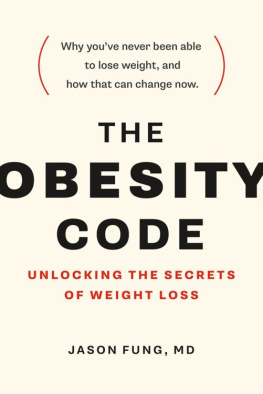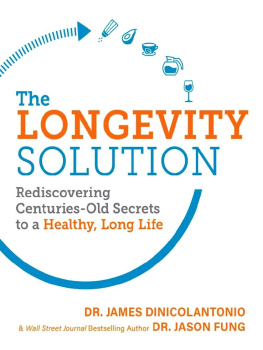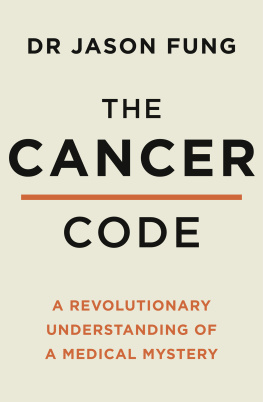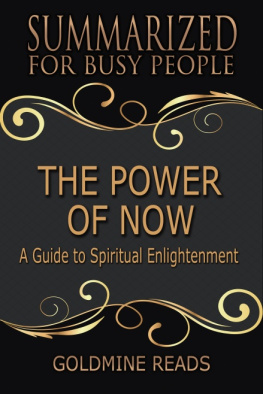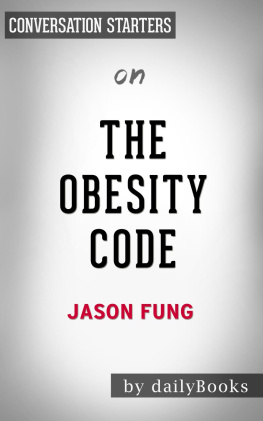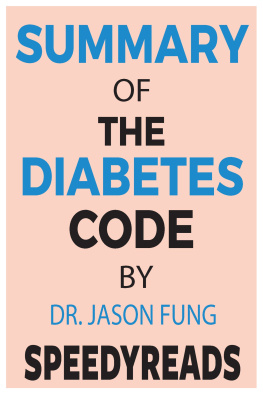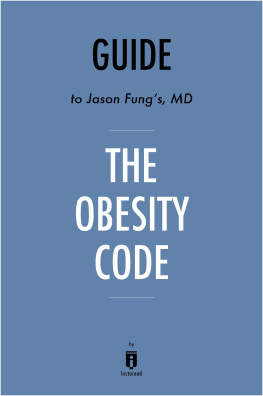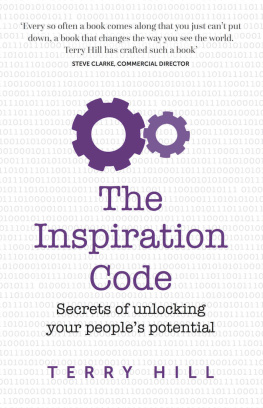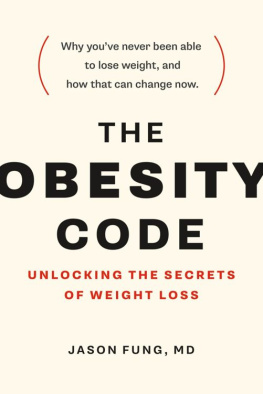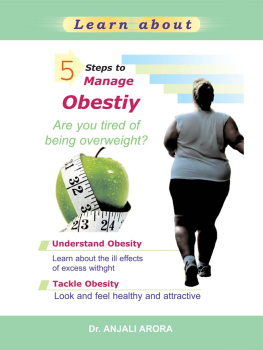Fung Jason - The Obesity Code: Unlocking the Secrets of Weight Loss
Here you can read online Fung Jason - The Obesity Code: Unlocking the Secrets of Weight Loss full text of the book (entire story) in english for free. Download pdf and epub, get meaning, cover and reviews about this ebook. City: Vancouver, year: 2016, publisher: Greystone Books, genre: Science. Description of the work, (preface) as well as reviews are available. Best literature library LitArk.com created for fans of good reading and offers a wide selection of genres:
Romance novel
Science fiction
Adventure
Detective
Science
History
Home and family
Prose
Art
Politics
Computer
Non-fiction
Religion
Business
Children
Humor
Choose a favorite category and find really read worthwhile books. Enjoy immersion in the world of imagination, feel the emotions of the characters or learn something new for yourself, make an fascinating discovery.
- Book:The Obesity Code: Unlocking the Secrets of Weight Loss
- Author:
- Publisher:Greystone Books
- Genre:
- Year:2016
- City:Vancouver
- Rating:5 / 5
- Favourites:Add to favourites
- Your mark:
- 100
- 1
- 2
- 3
- 4
- 5
The Obesity Code: Unlocking the Secrets of Weight Loss: summary, description and annotation
We offer to read an annotation, description, summary or preface (depends on what the author of the book "The Obesity Code: Unlocking the Secrets of Weight Loss" wrote himself). If you haven't found the necessary information about the book — write in the comments, we will try to find it.
The Obesity Code: Unlocking the Secrets of Weight Loss — read online for free the complete book (whole text) full work
Below is the text of the book, divided by pages. System saving the place of the last page read, allows you to conveniently read the book "The Obesity Code: Unlocking the Secrets of Weight Loss" online for free, without having to search again every time where you left off. Put a bookmark, and you can go to the page where you finished reading at any time.
Font size:
Interval:
Bookmark:
OBESITY CODE
THE SECRETS OF
WEIGHT LOSS

This book is dedicated to my beautiful wife, Mina.
Thank you for your love and the strength you give me. I could not do it without you, nor would I ever want to.
DR. JASON FUNG IS a Toronto physician specializing in the care of patients with kidney diseases. His key responsibility is to oversee the complex management of patients with end-stage kidney disease requiring renal (kidney) dialysis.
His credentials do not obviously explain why he should author a book titled The Obesity Code or why he blogs on the intensive dietary management of obesity and type 2 diabetes mellitus. To understand this apparent anomaly, we need first to appreciate who this man is and what makes him so unusual.
In treating patients with end-stage kidney disease, Dr. Fung learned two key lessons. First, that type 2 diabetes is the single commonest cause of kidney failure. Second, that renal dialysis, however sophisticated and even life prolonging, treats only the final symptoms of an underlying disease that has been present for twenty, thirty, forty or perhaps even fifty years. Gradually, it dawned on Dr. Fung that he was practicing medicine exactly as he had been taught: by reactively treating the symptoms of complex diseases without first trying to understand or correct their root causes.
He realized that to make a difference to his patients, he would have to start by acknowledging a bitter truth: that our venerated profession is no longer interested in addressing the causes of disease. Instead, it wastes much of its time and many of its resources attempting to treat symptoms.
He resolved to make a real difference to his patients (and his profession) by striving to understand the true causes that underlie disease.
Before December 2014, I was unaware of Dr. Jason Fungs existence. Then one day I chanced upon his two lecturesThe Two Big Lies of Type 2 Diabetes and How to Reverse Type 2 Diabetes Naturallyon YouTube. As someone with a special interest in type 2 diabetes, not least because I have the condition myself, I was naturally intrigued. Who, I thought, is this bright young man? What gives him the certainty that type 2 diabetes can be reversed naturally? And how can he be brave enough to accuse his noble profession of lying? He will need to present a good argument, I thought.
It took only a few minutes to realize that Dr. Fung is not only legitimate, but also more than able to look after himself in any medical scrap. The argument he presented was one that had been bouncing around, unresolved, in my own mind for at least three years. But I had never been able to see it with the same clarity or to explain it with the same emphatic simplicity as had Dr. Fung. By the end of his two lectures, I knew that I had observed a young master at work. Finally, I understood what I had missed.
What Dr. Fung achieved in those two lectures was to utterly destroy the currently popular model for the medical management of type 2 diabetesthe model mandated by all the different diabetes associations around the world. Worse, he explained why this erroneous model of treatment must inevitably harm the health of all patients unfortunate enough to receive it.
According to Dr. Fung, the first big lie in the management of type 2 diabetes is the claim that it is a chronically progressive disease that simply gets worse with time, even in those who comply with the best treatments modern medicine offers. But, Dr. Fung argues, this is simply not true. Fifty percent of the patients on Dr. Fungs Intensive Dietary Management (IDM) program, which combines dietary carbohydrate restriction and fasting, are able to stop using insulin after a few months.
So why are we unable to acknowledge the truth? Dr. Fungs answer is simple: we doctors lie to ourselves. If type 2 diabetes is a curable disease but all our patients are getting worse on the treatments we prescribe, then we must be bad doctors. And since we did not study for so long at such great cost to become bad doctors, this failure cannot be our fault. Instead, we must believe we are doing the best for our patients, who must unfortunately be suffering from a chronically progressive and incurable disease. It is not a deliberate lie, Dr. Fung concludes, but one of cognitive dissonancethe inability to accept a blatant truth because accepting it would be too emotionally devastating.
The second lie, according to Dr. Fung, is our belief that type 2 diabetes is a disease of abnormal blood glucose levels for which the only correct treatment is progressively increasing insulin dosages. He argues, instead, that type 2 diabetes is a disease of insulin resistance with excessive insulin secretionin contrast to type 1 diabetes, a condition of true insulin lack. To treat both conditions the same wayby injecting insulinmakes no sense. Why treat a condition of insulin excess with yet more insulin, he asks? That is the equivalent of prescribing alcohol for the treatment of alcoholism.
Dr. Fungs novel contribution is his insight that treatment in type 2 diabetes focuses on the symptom of the diseasean elevated blood glucose concentrationrather than its root cause, insulin resistance. And the initial treatment for insulin resistance is to limit carbohydrate intake. Understanding this simple biology explains why this disease may be reversible in some casesand, conversely, why the modern treatment of type 2 diabetes, which does not limit carbohydrate intake, worsens the outcome.
But how did Dr. Fung arrive at these outrageous conclusions? And how did they lead to his authorship of this book?
In addition to his realization, described above, of the long-term nature of disease and the illogic of treating a diseases symptoms rather than removing its cause, he also, almost by chance, in the early 2000s, became aware of the growing literature on the benefits of low-carbohydrate diets in those with obesity and other conditions of insulin resistance. Taught to believe that a carbohydrate-restricted, high-fat diet kills, he was shocked to discover the opposite: this dietary choice produces a range of highly beneficial metabolic outcomes, especially in those with the worst insulin resistance.
And finally came the cherry on the topa legion of hidden studies showing that for the reduction of body weight in those with obesity (and insulin resistance), this high-fat diet is at least as effective, and usually much more so, than other more conventional diets.
Eventually, he could bear it no longer. If everyone knows (but wont admit) that the low-fat calorie-restricted diet is utterly ineffective in controlling body weight or in treating obesity, surely it is time to tell the truth: the best hope for treating and preventing obesity, a disease of insulin resistance and excessive insulin production, must surely be the same low-carbohydrate, high-fat diet used for the management of the ultimate disease of insulin resistance, type 2 diabetes. And so this book was born.
In The Obesity Code, Dr. Fung has produced perhaps the most important popular book yet published on this topic of obesity.
Its strengths are that it is based on an irrefutable biology, the evidence for which is carefully presented; and it is written with the ease and confidence of a master communicator in an accessible, well-reasoned sequence so that its consecutive chapters systematically develop, layer by layer, an evidence-based biological model of obesity that makes complete sense in its logical simplicity. It includes just enough science to convince the skeptical scientist, but not so much that it confuses those without a background in biology. This feat in itself is a stunning achievement that few science writers ever accomplish.
Font size:
Interval:
Bookmark:
Similar books «The Obesity Code: Unlocking the Secrets of Weight Loss»
Look at similar books to The Obesity Code: Unlocking the Secrets of Weight Loss. We have selected literature similar in name and meaning in the hope of providing readers with more options to find new, interesting, not yet read works.
Discussion, reviews of the book The Obesity Code: Unlocking the Secrets of Weight Loss and just readers' own opinions. Leave your comments, write what you think about the work, its meaning or the main characters. Specify what exactly you liked and what you didn't like, and why you think so.

